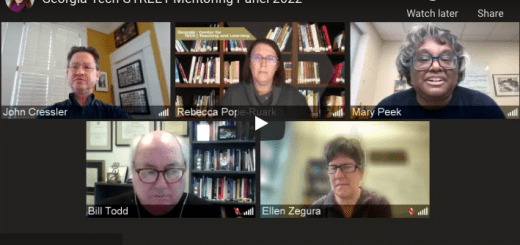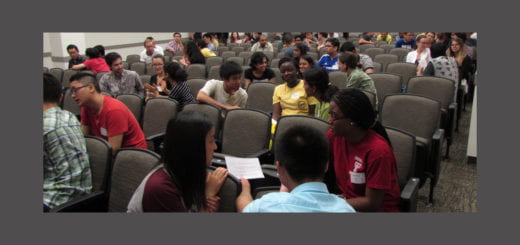Bringing Closure to the Semester

The end of the semester is marked by institutional rituals that include final instructional days, final projects, and final exams. It’s easy to get caught up in the stress of covering content, grading student work, and meeting institutional deadlines. However, what if we instead considered the end of semester an important teaching and learning opportunity? What if we focused on helping students solidify what they’ve learned in the course and connecting their learning to the future?
In this blog post, we’ll highlight some ideas about bringing the semester to a meaningful close and share several strategies for wrapping up the term that we gathered from Georgia Tech’s Provost Teaching and Learning Fellows.
- Integrate: Look back over the major themes and topics of the course from a big picture perspective. Engage students in activities that help them make connections across all that they have learned. Give students the opportunity to envision how they might apply what they have learned to questions and problems they find compelling.
- Reflect: Invite students to reflect on the ways in which the course connected to their values, interests, and personal and professional goals. These final reflections provide us with a view into how the course has impacted students and perhaps some insight into how we might enhance the impact of the course on students in future semesters.
- Empower: Invite students to suggest changes they would recommend to the course content, materials and course activities. Ask them to offer advice to future students about how to make the most of their time in the course, learn the content, or study for exams. These kinds of closing activities empower students to leave a legacy that improves the learning experience for many others.
- Express Gratitude: Thank students for their engagement in the course. Invite students to share their appreciation with those in the course who supported their learning, and with people in the community who served as resources who helped them get through the semester successfully. Invite them to submit a Thank a Teacher to people who provided support.
Below, six Provost Teaching and Learning Fellows share a few of the activities they use to engage their students in closing out the semester. Not all these ideas will work for all courses in all disciplines, but we hope that these examples from Georgia Tech colleagues will serve as a bit of inspiration as you head into the final instructional days:
David Anderson, Professor, Electrical and Computer Engineering
“I like to have students write potential final exam questions–it helps them think back through all that they have learned and evaluate what is important. I include several of the student questions on the final so that they are motivated to do a good job (so that theirs may be included). I do modify the questions (usually to make them more clear) and I also alter the numbers so that the creator will still need to solve the problem on the exam. Along with the questions, students also submit a worked-out solution. This is done as a homework problem.”
Rachel Dean-Ruzicka, Senior Lecturer, Literature, Media, and Communication
“We have a relatively rigid final portfolio system so I can’t do a lot at the end of term in ENGL 1101. I do like to have my developmental students revise a paper from earlier in the term, however, to highlight how their skills have grown.”
Betsy DiSalvo, Associate Professor, Interactive Computing
“When I start the final critique with each group, I explain that critiques are not me criticizing them, but asking them questions and asking them to reflect upon their choices – particularly how they tie data to findings and analysis.”
Mark Moss, Senior Lecturer, Computing Instruction
‘[1] I ask my students to make a very brief concept map of what they’ve learned over the semester from the course using this website: https://www.mindmup.com [2] Then, I ask them to focus on the concepts that have been the most impactful and/or challenging for them. I give them a few minutes to generate the map, and then allow them to export it as a PDF file and save it to a Canvas Assignment (optionally) for a small amount of bonus points. Then, I present “my version” which shows the various concepts organized along the course timeline, and showing them grouped by major themes. Finally, I finish with an informal discussion where I give them a chance to ask questions about the course structure, propose topics that they might find interesting, etc.”
Dima Nazzal, Principal Academic Professional, Industrial and Systems Engineering
“For Cornerstone (Junior) Design, students are asked to go to the Capstone Expo to walk through the posters, talk to the capstone senior design teams, take a selfie with their favorite capstone ISyE project and share a reflection on the discussion board that includes the picture and why they decided this was their favorite project poster.”“For the Capstone Senior Design, teams are encouraged to write an advice memo to future senior design teams. The categories can include anything from navigating relationship with faculty advisor, client (project sponsor), team dynamics, project organization, communications, etc. I then curate and use them for future cohorts. It’s valuable to the writer because it makes them reflect and learn, and it’s valuable to the recipient of the advice because they hear advice that’s specific from their senior peers.“
Michael Smith, Senior Lecturer, Scheller College of Business
“I engage my students in a simple but expansive reflective exercise. My prompt is: List three ways in which you see the world differently than you did before this course.”
What are some approaches you use to bring closure to your courses? Share to earn a token towards the Reflective Teaching Badge. Entries may be featured in future blog posts, too!





